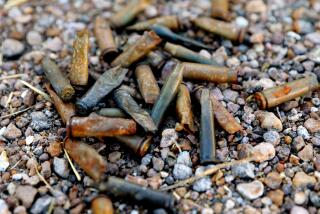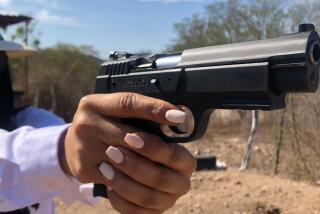Two nations rejoice over rescue
- Share via
PARIS — Ingrid Betancourt is a rare politician whose personal ordeal made her a heroine in two countries, a charismatic idealist whose endurance through six years of captivity created a shared sympathy between her native Colombia and France, where she grew up and held dual citizenship.
News that Betancourt had been rescued from her Marxist-rebel captors sparked celebrations in both countries. For Colombians, who knew her as a voice bravely demanding an end to endemic kidnappings, the years spent in chains at the hands of the Revolutionary Armed Forces of Colombia, or FARC, had transformed her from a marginal presidential candidate into a symbol of the suffering inflicted by drug- fueled violence.
“For Colombians, [her captivity] was an open wound,” said Jaime Abello, executive director of the Foundation for a New Iberoamerican Journalism, founded by Colombian Nobel laureate Gabriel Garcia Marquez. “It was as if they had captured someone like Obama or Hillary and held them, for years, in terrible conditions.”
Colombia’s joy over her release was matched in France, where Betancourt’s portrait hangs from banners at city halls across the country. Betancourt, the daughter of a Colombian diplomat and a former Miss Colombia, grew up in France, becoming a notable figure among the left-wing intelligentsia of Paris. She derived her French citizenship from her first marriage, to Fabrice Delloye, a diplomat.
The French public followed the dashed hopes and despair that marked her imprisonment: the failed rescue attempts, hunger strikes and, in recent months, alarm over reports that she was in failing health and increasingly depressed.
But Betancourt’s hold on the French psyche went beyond citizenship. A dark-haired beauty who appeared unafraid to challenge Colombia’s forces of corruption, she launched a strident campaign for president in 2002.
Her daring political style -- and the terrible consequences that followed her decision to wade unguarded into the Colombian jungle in pursuit of her ideals -- personified much of the French self-image.
“It’s like a great French romance novel with all the elements of adventure and politics and a beautiful woman,” said Bertrand Vannier, a senior correspondent for Radio France.
Vannier credited Betancourt’s former husband and two children who live in Paris with keeping her cause in the public eye, engaging France in a campaign to free her.
Public attention intensified last fall after Colombian security forces seized and broadcast a video showing a gaunt Betancourt with her hair grown below her waist, staring mournfully at the ground. News bulletins on French state radio began issuing weekly reminders about her plight.
And a letter Betancourt wrote to her mother, along with one to her from her children Melanie, 22, and Lorenzo, 19, were published in book form last December, a prelude to a national “day of support” for all 700 hostages held by the FARC.
On Wednesday, news of her freedom drew about 30 mostly young people to a spontaneous gathering in front of Paris City Hall, where a timer indicating the number of days she had been held hostage had finally stopped at 2,319.
“All of France was convinced that they wouldn’t free her,” said Celina Jamey, 30, who came out to mark the end of Betancourt’s nightmare. “This was a big battle for her -- and for France.”
It was a sentiment shared half a world away, where many hoped the rescue of the FARC’s trophy hostage would weaken the rebel group.
“In France she became the new Joan of Arc; in Colombia, her kidnapping converted her into an icon of the resistance to the FARC,” said Maria Jimena Duzan, a friend of Betancourt and a columnist for the weekly Semana.
“There is great jubilation,” Duzan said. “This is a happy ending in a country that is living many tragedies.”
--
O’Connor reported from Los Angeles and Baum from Paris. Special correspondent Devorah Lauter in Paris contributed to this report.
--
(BEGIN TEXT OF INFOBOX)
Back story:
The FARC
The Revolutionary Armed Forces of Colombia was established in 1964 as a Communist-inspired peasant army fighting for land reform and better economic conditions.
It was branded a terrorist group by the United States and the European Union, and has been put on the defensive by President Alvaro Uribe’s U.S.-backed security campaign.
U.S. and Colombian officials say the FARC has used the cocaine trade to fund its operations. Colombia’s conflict is now often a fight over drug-producing land among the FARC, right-wing paramilitaries and narcotics gangs.
The FARC still holds sway in some rural areas and keeps other hostages in secret jungle camps. Ingrid Betancourt and the three U.S. defense contractors were the group’s most high-profile captives. It had been seeking to exchange hostages for jailed rebels.
Two top rebel commanders were killed in March.
More to Read
Sign up for Essential California
The most important California stories and recommendations in your inbox every morning.
You may occasionally receive promotional content from the Los Angeles Times.













